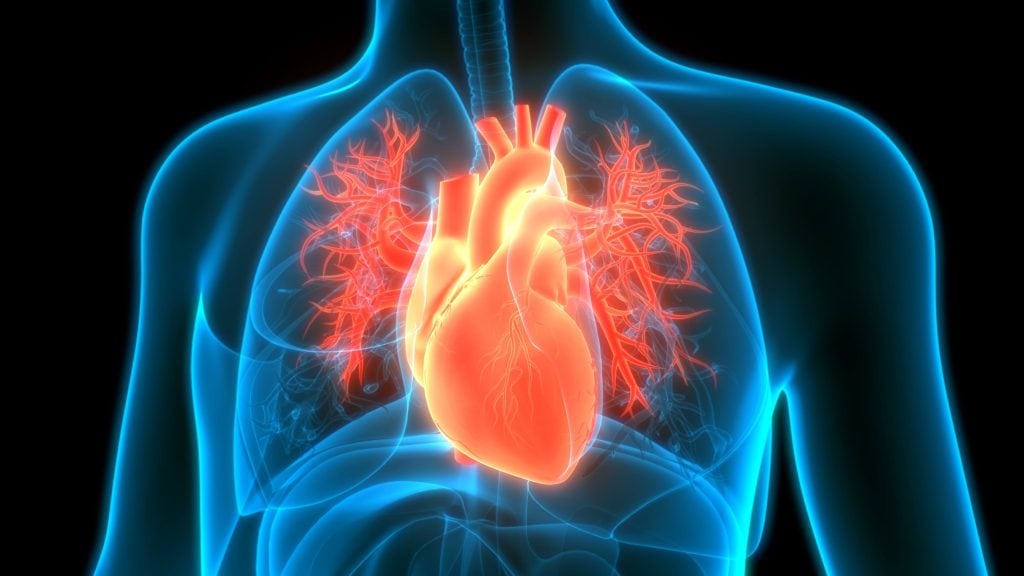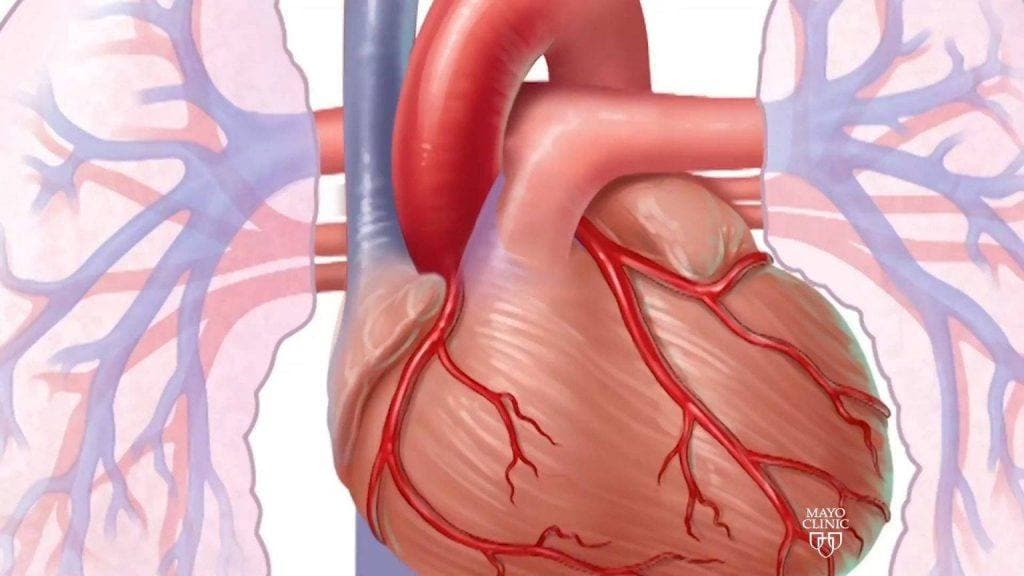Diagnosis
To diagnose dilated cardiomyopathy, your health care provider will do a physical exam and asks questions about your personal and family medical history. The provider will use a device called a stethoscope to listen to your heart and lungs. You may be referred to a doctor specializing in heart disease (cardiologist).
Tests
Tests to diagnose dilated cardiomyopathy include:
- Echocardiogram. This is the main test for diagnosing dilated cardiomyopathy. Sound waves produce images of the heart in motion. An echocardiogram shows how blood moves in and out of the heart and heart valves. It can tell if the left ventricle is enlarged.
- Blood tests. Different blood tests can be done to check for infections, substances or diseases — such as diabetes or hemochromatosis — that may lead to dilated cardiomyopathy.
- Chest X-ray. A chest X-ray shows the shape and condition of the heart and lungs. It can reveal fluid in or around the lungs.
- Electrocardiogram (ECG or EKG). This quick and easy test records the electrical activity of the heart. An electrocardiogram (ECG) can show how fast or how slow the heart is beating. Patterns in the signals can help diagnose heart rhythm disease or reduced blood flow.
- Holter monitor. This portable device can be worn for a day or more to record the heart's activity during daily activities.
- Exercise stress test. This test often involves walking on a treadmill or riding a stationary bike while the heart is monitored with . Exercise tests help reveal how the heart responds to physical activity. If you can't exercise, you might be given medications that mimic the effect of exercise on the heart.
- Heart (cardiac) CT or MRI scan. These imaging tests can show the size and function of the heart's pumping chambers. A cardiac CT scan uses a series of X-rays to create detailed images of the heart. A cardiac MRI uses magnetic fields and radio waves.
- Cardiac catheterization. During this procedure, one or more long thin tubes (catheters) are inserted into a blood vessel, usually in the groin, and guided to the heart. Dye flows through the catheter to help the heart arteries show up more clearly on X-ray images. During cardiac catheterization, a sample of tissue (biopsy) can be taken to check for heart muscle damage.
- Genetic screening or counseling. Cardiomyopathy can be passed down through families (inherited). Ask your health care provider if genetic testing is right for you. Family screening or genetic testing might include first-degree relatives — parents, siblings and children.
Treatment
Treatment of dilated cardiomyopathy depends on the causes. The goals of treatment are to reduce symptoms, improve blood flow and prevent further heart damage. Dilated cardiomyopathy treatment may include medications or surgery to implant a medical device that helps the heart beat or pump blood.
Medications
A combination of medications may be used to treat dilated cardiomyopathy and prevent any complications. Medications are used to:
- Control the heart's rhythm
- Help the heart pump better
- Lower blood pressure
- Prevent blood clots
- Reduce fluid from the body
Drugs that are used to treat heart failure and dilated cardiomyopathy include:
- Blood pressure medications. Different types of drugs may be used to lower blood pressure, improve blood flow and reduce the strain on the heart. Such medications include beta-blockers, angiotensin-converting enzyme (ACE) inhibitors and angiotensin II receptor blockers (ARBs).
- Sacubitril/valsartan (Entresto). This drug combines an angiotensin two receptor blocker (ARB) with another type of medicine to help the heart better pump blood to the rest of the body. It's used to treat those with chronic heart failure.
- Water pills (diuretics). A diuretic removes excess fluid and salt from the body. Too much fluid in the body strains the heart and can make it difficult to breathe.
- Digoxin (Lanoxin). This drug can strengthen heart muscle contractions. It also tends to slow the heartbeat. Digoxin may reduce heart failure symptoms and make it easier to be active.
- Ivabradine (Corlanor). Rarely, this drug may be used to manage heart failure caused by dilated cardiomyopathy.
- Blood-thinners (anticoagulants). These drugs help prevent blood clots.
Surgeries or other procedures
Surgery may be needed to implant a device to control the heart's rhythm or help the heart pump blood. Type of devices used to treat dilated cardiomyopathy include:
- Biventricular pacemaker. This device is for people who have heart failure and irregular heartbeats. A biventricular pacemaker stimulates both of the lower heart chambers (the right and left ventricles) to make the heart beat better.
- Implantable cardioverter-defibrillators (ICD). An implantable cardioverter-defibrillator (ICD) doesn't treat cardiomyopathy itself. It monitors the heart rhythm and delivers electrical shocks if an irregular heartbeat (arrhythmia) is detected. Cardiomyopathy can cause dangerous arrhythmias, including those that cause the heart to stop.
- Left ventricular assist devices (LVAD). This mechanical device helps a weakened heart pump better. A left ventricular assist device (LVAD) usually is considered after less invasive approaches are unsuccessful. It can be used as a long-term treatment or as a short-term treatment while waiting for a heart transplant.
If medications and other treatments for dilated cardiomyopathy no longer work, a heart transplant may be needed.
Self care
If you have dilated cardiomyopathy, these self-care strategies may help you manage your symptoms:
- Eat a heart-healthy diet. Choose whole grains and a variety of fruits and vegetables. Limit salt, added sugar, cholesterol, and trans and saturated fats. Ask your care provider for a referral to a dietitian if you need help planning your diet.
- Exercise. Talk to your provider about what activities would be safe and beneficial for you. In general, competitive sports aren't recommended because they can increase the risk of the heart stopping and causing sudden death.
- Maintain a healthy weight. Extra weight makes the heart work harder.
- Quit smoking. If you need help, a care provider can recommend or prescribe strategies to help you stop smoking.
- Avoid or limit alcohol. Talk to your health care provider about alcohol use and whether it's safe for you.
- Don't use illegal drugs. Using cocaine or other stimulant drugs can strain the heart.
Preparing for your appointment
If you think you may have dilated cardiomyopathy or are worried about your risk because of a family history, make an appointment with your health care provider. Your provider may refer you to a doctor that specializes in heart diseases (cardiologist).
Here's information to help you get ready for your appointment.
What you can do
- Be aware of any pre-appointment restrictions. When you make the appointment, ask if there's anything you need to do in advance, such as restrict your diet.
- Write down your symptoms, including any that may seem unrelated to dilated cardiomyopathy, and when they began.
- Write down key personal information, including major stresses or recent life changes and a family history of heart disease, stroke, high blood pressure or diabetes.
- List all medications, vitamins and supplements you take, including doses.
- Take a family member or friend along, if possible. Someone who accompanies you may remember something that you missed or forgot.
- Be prepared to discuss your diet and exercise habits. If you don't already follow a diet or exercise routine, talk to your provider about how to get started.
- Write down questions to ask your provider.
For dilated cardiomyopathy, some basic questions include:
- What is likely causing my symptoms or condition?
- What are other possible causes?
- What tests will I need?
- What's the best treatment?
- What are the alternatives to the primary approach you're suggesting?
- Is there a generic alternative to the medicine you're prescribing?
- How should I change my diet?
- What's an appropriate level of physical activity?
- Should my family be screened for dilated cardiomyopathy?
- I have other health conditions. How can I best manage them together?
- Are there brochures or other printed materials I can have? What websites do you recommend?
What to expect from your doctor
Your provider is likely to ask you several questions, including:
- Do you always have symptoms or do they come and go?
- How severe are the symptoms?
- What, if anything, improves your symptoms?
- What, if anything, makes your symptoms worse?
- Do any of your blood relatives have dilated cardiomyopathy or other types of heart disease?


